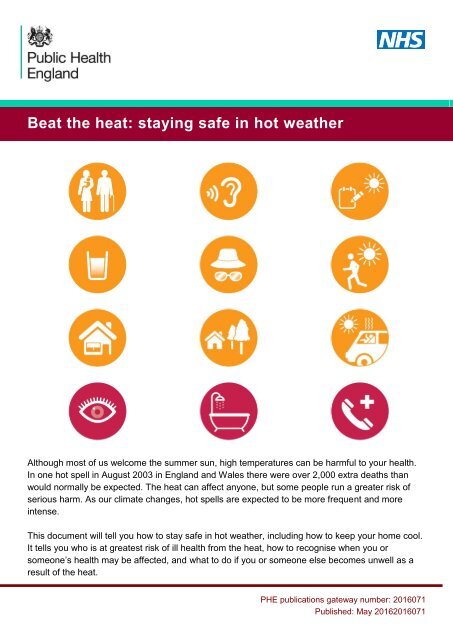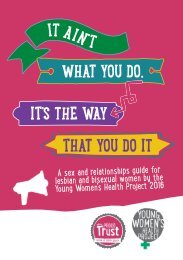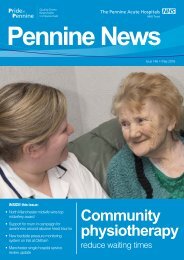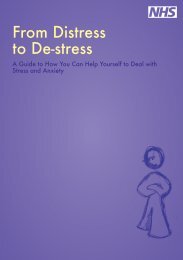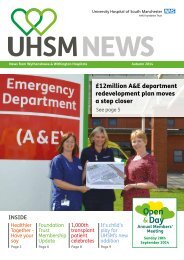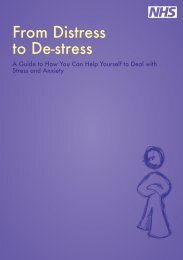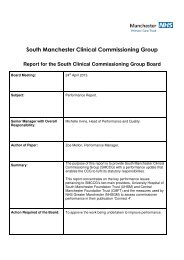Beat the heat staying safe in hot weather
WxqhNk
WxqhNk
Create successful ePaper yourself
Turn your PDF publications into a flip-book with our unique Google optimized e-Paper software.
<strong>Beat</strong> <strong>the</strong> <strong>heat</strong>: <strong>stay<strong>in</strong>g</strong> <strong>safe</strong> <strong>in</strong> <strong>hot</strong> wea<strong>the</strong>r<br />
Although most of us welcome <strong>the</strong> summer sun, high temperatures can be harmful to your health.<br />
In one <strong>hot</strong> spell <strong>in</strong> August 2003 <strong>in</strong> England and Wales <strong>the</strong>re were over 2,000 extra deaths than<br />
would normally be expected. The <strong>heat</strong> can affect anyone, but some people run a greater risk of<br />
serious harm. As our climate changes, <strong>hot</strong> spells are expected to be more frequent and more<br />
<strong>in</strong>tense.<br />
This document will tell you how to stay <strong>safe</strong> <strong>in</strong> <strong>hot</strong> wea<strong>the</strong>r, <strong>in</strong>clud<strong>in</strong>g how to keep your home cool.<br />
It tells you who is at greatest risk of ill health from <strong>the</strong> <strong>heat</strong>, how to recognise when you or<br />
someone’s health may be affected, and what to do if you or someone else becomes unwell as a<br />
result of <strong>the</strong> <strong>heat</strong>.<br />
PHE publications gateway number: 2016071<br />
Published: May 20162016071
Stay connected<br />
Look after<br />
yourself,<br />
check on<br />
o<strong>the</strong>rs<br />
especially <strong>the</strong><br />
elderly<br />
Why is this important?<br />
<strong>the</strong> <strong>heat</strong> can affect anyone, but some people run a greater risk of serious<br />
harm. Remember to th<strong>in</strong>k of those who may be more at risk from <strong>the</strong> effects<br />
of <strong>heat</strong> – <strong>the</strong>se <strong>in</strong>clude <strong>the</strong> follow<strong>in</strong>g:<br />
o older people, especially those over 75<br />
o babies and young children<br />
o people with a serious chronic condition, particularly dementia, heart,<br />
breath<strong>in</strong>g or mobility problems<br />
o people with serious mental health problems<br />
o people on certa<strong>in</strong> medications, <strong>in</strong>clud<strong>in</strong>g those that affect sweat<strong>in</strong>g and<br />
temperature control (for example, diuretics, antihistam<strong>in</strong>es, beta-blockers<br />
and antipsyc<strong>hot</strong>ics)<br />
o people who are already ill and dehydrated (for example, from<br />
gastroenteritis)<br />
o people who misuse alcohol or drugs<br />
o people who are physically active (for example, soldiers, athletes, hikers<br />
and manual workers)<br />
o homeless people<br />
What can I do?<br />
stay out of <strong>the</strong> <strong>heat</strong>, cool yourself down, keep your environment cool or f<strong>in</strong>d<br />
somewhere else that is cool<br />
look out for neighbours, family or friends who may be isolated and unable to<br />
care for <strong>the</strong>mselves; make sure <strong>the</strong>y are able to keep cool dur<strong>in</strong>g a <strong>heat</strong>wave<br />
get medical advice if you are suffer<strong>in</strong>g from a chronic medical condition or<br />
tak<strong>in</strong>g multiple medications<br />
make sure medic<strong>in</strong>es are stored below 25°C or <strong>in</strong> <strong>the</strong> fridge (read <strong>the</strong> storage<br />
<strong>in</strong>structions on <strong>the</strong> packag<strong>in</strong>g)<br />
carry on tak<strong>in</strong>g all prescribed medic<strong>in</strong>es unless advised not to by a medical<br />
professional. But be aware that some prescription medic<strong>in</strong>es can reduce your<br />
tolerance of <strong>heat</strong><br />
be alert and if someone is unwell or needs fur<strong>the</strong>r help, see <strong>the</strong> resources<br />
section at <strong>the</strong> end of this leaflet<br />
Page 2<br />
<strong>Beat</strong> <strong>the</strong> <strong>heat</strong>: <strong>stay<strong>in</strong>g</strong> <strong>safe</strong> <strong>in</strong> <strong>hot</strong> wea<strong>the</strong>r
Listen to <strong>the</strong><br />
wea<strong>the</strong>r<br />
forecast and<br />
<strong>the</strong> news<br />
Why is this important?<br />
know<strong>in</strong>g <strong>the</strong> forecast can help you plan ahead and adapt as necessary<br />
<strong>heat</strong>waves may affect o<strong>the</strong>r services, such as power and water supplies, and<br />
transport<br />
air pollution can become worse dur<strong>in</strong>g periods of <strong>hot</strong> wea<strong>the</strong>r<br />
What can I do?<br />
listen to <strong>the</strong> news to be aware of when a <strong>heat</strong>wave has been forecast and<br />
how long it is likely to last<br />
check <strong>the</strong> wea<strong>the</strong>r forecast and any high temperature health warn<strong>in</strong>gs at<br />
www.metoffice.gov.uk<br />
recommended actions and health advice for <strong>the</strong> general population and<br />
those who may be particularly sensitive to air pollution are available from<br />
UK-AIR by call<strong>in</strong>g 0800 55 66 77 (recorded <strong>in</strong>formation) or visit<strong>in</strong>g<br />
https://uk-air.defra.gov.uk/<br />
Plan ahead to<br />
avoid <strong>the</strong> <strong>heat</strong><br />
Why is this important?<br />
it is best to avoid gett<strong>in</strong>g too <strong>hot</strong> <strong>in</strong> <strong>the</strong> first place<br />
if you plan ahead you can avoid situations where you become dangerously<br />
<strong>hot</strong><br />
What can I do?<br />
avoid be<strong>in</strong>g out <strong>in</strong> <strong>the</strong> sun dur<strong>in</strong>g <strong>the</strong> <strong>hot</strong>test part of <strong>the</strong> day (around midday)<br />
and plan your day to avoid heavy activity dur<strong>in</strong>g extreme <strong>heat</strong><br />
br<strong>in</strong>g everyth<strong>in</strong>g you will need with you, such as a bottle of water, sun cream<br />
and a hat<br />
if you have to go out <strong>in</strong> <strong>the</strong> <strong>heat</strong>, walk <strong>in</strong> <strong>the</strong> shade, apply sunscreen, and<br />
wear a hat and light cloth<strong>in</strong>g<br />
be prepared, as <strong>heat</strong>waves can affect transport services and you might need<br />
extra water<br />
Page 3<br />
<strong>Beat</strong> <strong>the</strong> <strong>heat</strong>: <strong>stay<strong>in</strong>g</strong> <strong>safe</strong> <strong>in</strong> <strong>hot</strong> wea<strong>the</strong>r
Keep well<br />
Dr<strong>in</strong>k plenty of<br />
water, avoid<br />
alcohol and<br />
caffe<strong>in</strong>e<br />
Why is this important?<br />
everyone is at risk of dehydration <strong>in</strong> <strong>hot</strong> temperatures<br />
some dr<strong>in</strong>ks can <strong>in</strong>crease dehydration such as dr<strong>in</strong>ks with alcohol or caffe<strong>in</strong>e<br />
(<strong>in</strong>clud<strong>in</strong>g tea, coffee or cola dr<strong>in</strong>ks), and dr<strong>in</strong>ks high <strong>in</strong> sugar<br />
What can I do?<br />
have plenty of cold dr<strong>in</strong>ks, and avoid excess alcohol, caffe<strong>in</strong>e or dr<strong>in</strong>ks high<br />
<strong>in</strong> sugar. If dr<strong>in</strong>k<strong>in</strong>g fruit juice, dilute it with water<br />
if you’re not ur<strong>in</strong>at<strong>in</strong>g frequently or your ur<strong>in</strong>e is dark, it's a sign that you're<br />
becom<strong>in</strong>g dehydrated and need to dr<strong>in</strong>k more<br />
eat cold foods, particularly salads and fruit with a high water content<br />
if you are fast<strong>in</strong>g for Ramadan dur<strong>in</strong>g a <strong>heat</strong> wave, it is important to dr<strong>in</strong>k<br />
before dawn and follow <strong>the</strong> advice here to keep cool and prevent<br />
dehydration. If you become dehydrated you should break <strong>the</strong> fast <strong>in</strong> order to<br />
re-hydrate, this can be compensated by fast<strong>in</strong>g at a later date. People with<br />
certa<strong>in</strong> conditions should not fast, more <strong>in</strong>formation is available at<br />
http://www.nhs.uk/Livewell/Healthyramadan/Pages/faqs.aspx<br />
Dress<br />
appropriately<br />
for <strong>the</strong><br />
wea<strong>the</strong>r<br />
Why is this important?<br />
dress<strong>in</strong>g appropriately can protect you from <strong>the</strong> sun’s radiation and keep you<br />
cool to prevent <strong>heat</strong> related illness<br />
children are particularly at risk of sk<strong>in</strong> damage from <strong>the</strong> sun<br />
What can I do?<br />
if you have to go out <strong>in</strong> <strong>the</strong> <strong>heat</strong>, walk <strong>in</strong> <strong>the</strong> shade and wear lightweight,<br />
loose-fitt<strong>in</strong>g, light coloured cotton clo<strong>the</strong>s<br />
wear suitable head wear, such as a wide-brimmed hat, to reduce exposure to<br />
<strong>the</strong> face, eyes, head and neck<br />
when exposed to direct sunlight, cover your sk<strong>in</strong> with cloth<strong>in</strong>g giv<strong>in</strong>g good<br />
protection; examples are long-sleeved shirts and loose cloth<strong>in</strong>g with a close<br />
weave. At home wear as little cloth<strong>in</strong>g as necessary<br />
sunglasses should exclude both direct and peripheral exposure of <strong>the</strong> eye to<br />
ultraviolet (UV) radiation, so a wraparound design is best<br />
apply sunblock, or broad-spectrum sunscreens, with high sun protection<br />
factor (SPF) of at least SPF 15 and with UVA protection regularly to<br />
exposed sk<strong>in</strong><br />
Page 4<br />
<strong>Beat</strong> <strong>the</strong> <strong>heat</strong>: <strong>stay<strong>in</strong>g</strong> <strong>safe</strong> <strong>in</strong> <strong>hot</strong> wea<strong>the</strong>r
Slow down<br />
and avoid<br />
heavy activity<br />
Why is this important?<br />
heavy activity can make you prone to <strong>heat</strong> related illnesses<br />
What can I do?<br />
avoid extreme physical exertion. If you can’t avoid strenuous outdoor activity,<br />
such as sport, DIY or garden<strong>in</strong>g, keep it for cooler parts of <strong>the</strong> day – for<br />
example, <strong>in</strong> <strong>the</strong> early morn<strong>in</strong>g or even<strong>in</strong>g<br />
children should not take part <strong>in</strong> vigorous physical activity on very <strong>hot</strong> days,<br />
such as when temperatures are above 30°C<br />
F<strong>in</strong>d somewhere cool<br />
Know how to<br />
keep your<br />
home cool<br />
Why is this important?<br />
even dur<strong>in</strong>g a relatively cool summer, 1 <strong>in</strong> 5 homes are likely to over<strong>heat</strong><br />
for many people, this makes life uncomfortable and sleep<strong>in</strong>g difficult<br />
some people are particularly vulnerable to <strong>heat</strong> and for <strong>the</strong>m a <strong>hot</strong> home can<br />
worsen exist<strong>in</strong>g health conditions, or even kill<br />
What can I do?<br />
<strong>in</strong> preparation for warmer wea<strong>the</strong>r, use our simple checklist to f<strong>in</strong>d out if your<br />
home is at risk of over<strong>heat</strong><strong>in</strong>g and what you can do if <strong>the</strong>re is a problem. You<br />
can download <strong>the</strong> checklist from <strong>the</strong> PHE <strong>heat</strong>wave webpage<br />
https://www.gov.uk/government/publications/<strong>heat</strong>wave-plan-for-england<br />
shade or cover w<strong>in</strong>dows exposed to direct sunlight, external shutters or<br />
shades are very effective, while <strong>in</strong>ternal bl<strong>in</strong>ds or curta<strong>in</strong>s are less effective<br />
but cheaper and easier to <strong>in</strong>stall<br />
metallic bl<strong>in</strong>ds and dark curta<strong>in</strong>s can make a room <strong>hot</strong>ter<br />
open w<strong>in</strong>dows when <strong>the</strong> air feels cooler outside than <strong>in</strong>side, for example, at<br />
night. Try to get air flow<strong>in</strong>g through your home, if possible<br />
turn off <strong>the</strong> central <strong>heat</strong><strong>in</strong>g<br />
turn off lights and electrical equipment that aren’t <strong>in</strong> use<br />
use electric fans if <strong>the</strong> temperature is below 35°C, but do not aim <strong>the</strong> fan<br />
directly at <strong>the</strong> body and ensure you stay hydrated with regular dr<strong>in</strong>ks<br />
check that fridges, freezers and fans are work<strong>in</strong>g properly<br />
If <strong>in</strong>sulat<strong>in</strong>g your home, ask for advice about avoid<strong>in</strong>g over<strong>heat</strong><strong>in</strong>g <strong>in</strong> summer<br />
consider <strong>the</strong> risk of over<strong>heat</strong><strong>in</strong>g if buy<strong>in</strong>g or rent<strong>in</strong>g, particularly for vulnerable<br />
people<br />
if you have concerns about an uncomfortably <strong>hot</strong> home that is affect<strong>in</strong>g your<br />
health or someone else’s health, seek medical advice<br />
get help from <strong>the</strong> environmental health department with<strong>in</strong> your local authority;<br />
<strong>the</strong>y can do a home hazard assessment<br />
if consider<strong>in</strong>g home improvements to reduce over<strong>heat</strong><strong>in</strong>g, you can get help<br />
and advice from Foundations or, if you are elderly, FirstStop may be able to<br />
help (contact details listed below)<br />
Page 5<br />
<strong>Beat</strong> <strong>the</strong> <strong>heat</strong>: <strong>stay<strong>in</strong>g</strong> <strong>safe</strong> <strong>in</strong> <strong>hot</strong> wea<strong>the</strong>r
Go <strong>in</strong>doors or<br />
outdoors,<br />
whichever<br />
feels cooler<br />
Why is this important?<br />
it is important for your health to avoid gett<strong>in</strong>g <strong>hot</strong> <strong>in</strong> <strong>the</strong> first place<br />
if you do get <strong>hot</strong>, it is important to give your body a break from <strong>the</strong> <strong>heat</strong><br />
it may be cooler outside <strong>in</strong> <strong>the</strong> shade than it is <strong>in</strong>side an over<strong>heat</strong>ed build<strong>in</strong>g<br />
What can I do?<br />
take a break from <strong>the</strong> <strong>heat</strong> by mov<strong>in</strong>g to a cooler part of <strong>the</strong> house<br />
(especially for sleep<strong>in</strong>g)<br />
f<strong>in</strong>d some shaded green space or have a cool bath or shower<br />
remember lots of public build<strong>in</strong>gs (such as places of worship, local libraries<br />
or supermarkets) can be cool <strong>in</strong> summer; consider a visit as a way of<br />
cool<strong>in</strong>g down<br />
Cars get <strong>hot</strong>,<br />
avoid closed<br />
spaces<br />
Why is this important?<br />
small closed spaces, such as cars, can get dangerously <strong>hot</strong> very quickly<br />
some people, especially babies, young children and older people f<strong>in</strong>d it<br />
harder to stay cool<br />
<strong>the</strong>y may not be able to move <strong>the</strong>mselves to a cool place if <strong>the</strong>y are<br />
dependent on o<strong>the</strong>rs<br />
What can I do?<br />
ensure that babies, children or older people are not left alone <strong>in</strong> stationary<br />
cars or o<strong>the</strong>r closed spaces<br />
look out for children <strong>in</strong> prams or pushchairs <strong>in</strong> <strong>hot</strong> wea<strong>the</strong>r; keep <strong>the</strong>m <strong>in</strong> <strong>the</strong><br />
shade, remove excess cloth<strong>in</strong>g, ensure <strong>the</strong>re is adequate air flow, and check<br />
regularly to ensure <strong>the</strong>y are not over<strong>heat</strong>ed<br />
for more <strong>in</strong>formation about how to identify if a baby/child is over<strong>heat</strong>ed, visit<br />
NHS Choices (http://www.nhs.uk/Conditions/Heat-exhaustion-and<strong>heat</strong>stroke/Pages/Introduction.aspx?url=Pages/What-is-it.aspx)<br />
Page 6<br />
<strong>Beat</strong> <strong>the</strong> <strong>heat</strong>: <strong>stay<strong>in</strong>g</strong> <strong>safe</strong> <strong>in</strong> <strong>hot</strong> wea<strong>the</strong>r
Watch out<br />
Be on <strong>the</strong><br />
lookout for<br />
signs of <strong>heat</strong><br />
related illness<br />
Why is this important?<br />
chronic illnesses can get worse <strong>in</strong> <strong>hot</strong> wea<strong>the</strong>r<br />
<strong>heat</strong> exhaustion and <strong>heat</strong>stroke are two potentially serious conditions that<br />
can occur if you get too <strong>hot</strong>:<br />
o <strong>heat</strong> exhaustion is where you become very <strong>hot</strong> and start to lose water or<br />
salt from your body. Common symptoms <strong>in</strong>clude weakness, feel<strong>in</strong>g fa<strong>in</strong>t,<br />
headache, muscle cramps, feel<strong>in</strong>g sick, heavy sweat<strong>in</strong>g and <strong>in</strong>tense thirst<br />
o <strong>heat</strong>stroke is where <strong>the</strong> body is no longer able to cool itself and a person's<br />
body temperature becomes dangerously high. Heatstroke is less common,<br />
but more serious. Untreated symptoms <strong>in</strong>clude confusion, seizures and<br />
loss of consciousness<br />
What can I do?<br />
you can f<strong>in</strong>d out more, such as common signs and symptoms to look out<br />
for, on NHS Choices (http://www.nhs.uk/conditions/Heat-exhaustion-and<strong>heat</strong>stroke/Pages/Introduction.aspx)<br />
If you’re too<br />
<strong>hot</strong>, cool your<br />
sk<strong>in</strong> with<br />
water, slow<br />
down and<br />
rehydrate<br />
Why is this important?<br />
if <strong>heat</strong> exhaustion isn't spotted and treated early on, <strong>the</strong>re's a risk it could<br />
lead to <strong>heat</strong>stroke. Untreated <strong>heat</strong>stroke can be fatal<br />
What can I do?<br />
if you notice that someone has signs of <strong>heat</strong> related illness, you should:<br />
o get <strong>the</strong>m to lie down <strong>in</strong> a cool place – such as a room with air<br />
condition<strong>in</strong>g or somewhere <strong>in</strong> <strong>the</strong> shade<br />
o remove any unnecessary cloth<strong>in</strong>g to expose as much of <strong>the</strong>ir sk<strong>in</strong> as<br />
possible<br />
o cool <strong>the</strong>ir sk<strong>in</strong> with cool water, you could use a cool wet sponge or<br />
flannel, cool water spray, cold packs around <strong>the</strong> neck and armpits, or wrap<br />
<strong>the</strong>m <strong>in</strong> a cool, wet sheet<br />
o fan <strong>the</strong>ir sk<strong>in</strong> while it’s moist – this will help <strong>the</strong> water to evaporate,<br />
which will help <strong>the</strong>ir sk<strong>in</strong> cool down. An electric fan could be helpful to<br />
create an air current if <strong>the</strong> temperature is below 35 o C, but fans can cause<br />
excess dehydration so <strong>the</strong>y should not be aimed directly on <strong>the</strong> body and<br />
will not be enough to keep <strong>the</strong>m cool at temperatures above 35 o C<br />
o get <strong>the</strong>m to dr<strong>in</strong>k cool fluids – <strong>the</strong>se should ideally be water, diluted fruit<br />
juice or a rehydration dr<strong>in</strong>k, such as a sports dr<strong>in</strong>k<br />
o do not give <strong>the</strong>m aspir<strong>in</strong> or paracetamol – this can put <strong>the</strong> body under<br />
more stra<strong>in</strong>. They should carry on tak<strong>in</strong>g all o<strong>the</strong>r prescribed medic<strong>in</strong>es<br />
unless advised not to by a medical professional<br />
stay with <strong>the</strong> person until <strong>the</strong>y're feel<strong>in</strong>g better. Most people should start to<br />
recover with<strong>in</strong> 30 m<strong>in</strong>utes<br />
Page 7<br />
<strong>Beat</strong> <strong>the</strong> <strong>heat</strong>: <strong>stay<strong>in</strong>g</strong> <strong>safe</strong> <strong>in</strong> <strong>hot</strong> wea<strong>the</strong>r
Get help. Call<br />
NHS 111 or <strong>in</strong><br />
an emergency<br />
999<br />
Why is this important?<br />
severe <strong>heat</strong> exhaustion or <strong>heat</strong>stroke requires hospital treatment<br />
What can I do?<br />
if a person has improved with <strong>the</strong> cool<strong>in</strong>g advice above but you still have<br />
concerns about <strong>the</strong>m, contact your GP or NHS 111 for advice<br />
you should call 999 for an ambulance if:<br />
o <strong>the</strong> person doesn't respond to <strong>the</strong> above cool<strong>in</strong>g treatments with<strong>in</strong><br />
30 m<strong>in</strong>utes<br />
o <strong>the</strong> person has severe symptoms, such as a loss of consciousness,<br />
confusion or seizures<br />
if <strong>the</strong> person is unconscious, you should follow <strong>the</strong> steps above and place<br />
<strong>the</strong>m <strong>in</strong> <strong>the</strong> recovery position until help arrives. If <strong>the</strong>y have a seizure,<br />
move nearby objects out of <strong>the</strong> way to prevent <strong>in</strong>jury<br />
For more <strong>in</strong>formation<br />
NHS Choices ‘Heatwave: be prepared’ http://www.nhs.uk/<strong>heat</strong>wave<br />
NHS Choices ‘Heat exhaustion and <strong>heat</strong> stroke’ http://www.nhs.uk/Conditions/Heat-exhaustionand-<strong>heat</strong>stroke/Pages/Introduction.aspx?url=Pages/What-is-it.aspx<br />
NHS 111 for free medical advice for any non-emergency 24 hours a day: call 111<br />
PHE <strong>heat</strong>wave <strong>in</strong>formation <strong>in</strong>clud<strong>in</strong>g a checklist for identify<strong>in</strong>g and manag<strong>in</strong>g <strong>in</strong>door<br />
over<strong>heat</strong><strong>in</strong>g: available at https://www.gov.uk/government/publications/<strong>heat</strong>wave-plan-forengland<br />
Met Office wea<strong>the</strong>r forecast and high temperature health warn<strong>in</strong>gs: www.metoffice.gov.uk<br />
Red Cross emergency app has <strong>in</strong>formation and alerts, available at<br />
http://www.redcross.org.uk/What-we-do/Emergency-response/Emergency-app<br />
local authority contact details: http://local.direct.gov.uk/LDGRedirect/Start.do?mode=1<br />
local accredited home improvement agency or handyperson services: Foundations<br />
(http://www.f<strong>in</strong>dmyhia.org.uk/ or call 0300 124 0315) or, for elderly people, FirstStop<br />
(http://www.firststopcareadvice.org.uk/ or call 0800 377 7070)<br />
Sunsmart – <strong>in</strong>formation about say<strong>in</strong>g <strong>safe</strong> <strong>in</strong> <strong>the</strong> sun: www.sunsmart.org.uk/<br />
UK-AIR – health advice about those who may be particularly sensitive to air pollution: https://ukair.defra.gov.uk/<br />
or call 0800 55 66 77<br />
free air quality text alerts: http://www.airtext.<strong>in</strong>fo/ or text 78070<br />
First published: May 2016<br />
© Crown copyright 2016<br />
Re-use of Crown copyright material (exclud<strong>in</strong>g logos) is allowed under <strong>the</strong> terms of <strong>the</strong><br />
Open Government Licence, visit http://www.nationalarchives.gov.uk/doc/open-governmentlicence/version/3/<br />
for terms and conditions.<br />
Page 8<br />
<strong>Beat</strong> <strong>the</strong> <strong>heat</strong>: <strong>stay<strong>in</strong>g</strong> <strong>safe</strong> <strong>in</strong> <strong>hot</strong> wea<strong>the</strong>r


